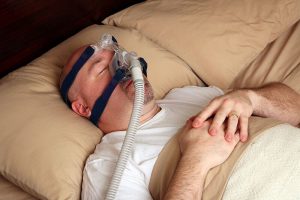What is sleep apnea?
Sleep apnea is a sleeping disorder where the patient’s breathing starts and stops during sleep. The involuntary obstruction in breathing can be a result of a blocked airway or the failure of nerve signals to reach the brain. Most people don’t think snoring is a big deal, but it can be the cause of a serious underlying problem such as; sleep apnea If that is the case, it must be treated right away as it can make you feel exhausted during the day, affect your mood and pose serious health problems.
Chronic sleep deprivation caused by sleep apnea can seriously alter the efficiency of people. It can also cause accidents during the day. One telling signal of sleep apnea is when one complains about snoring.
Types of Sleep Apnea
Sleep apnea is of three types:
- Central Sleep Apnea
- Obstructive Sleep Apnea
- Mixed Sleep Apnea
Central Sleep Apnea (CSA)
 This type of sleep apnea is characterized by the absence of effort to breathe typically for 10-30 seconds. Sleep obstruction is caused when levels of oxygen drop, and carbon dioxide levels rise. In this type of sleep apnea, the brain’s respiratory receptors located in the Pre-Botzinger Complex are not actively working, as the body is in the state of sleep. The sleeper stops breathing for up to two minutes.
This type of sleep apnea is characterized by the absence of effort to breathe typically for 10-30 seconds. Sleep obstruction is caused when levels of oxygen drop, and carbon dioxide levels rise. In this type of sleep apnea, the brain’s respiratory receptors located in the Pre-Botzinger Complex are not actively working, as the body is in the state of sleep. The sleeper stops breathing for up to two minutes.
Sleep apnea is followed by hyperpnea when the patient tries to make up for the interval where the breathing had stopped. As a result of CSA, the patient wakes up with an increased heart rate. Central Sleep Apnea can also be caused by other conditions such as heart failure and stroke.
Sleeping at a high altitude can also cause sleep apnea because of the absence of required oxygen. A patient with sleep apnea needs to monitor their breathing patterns.
Symptoms of Central Sleep Apnea
- No abdominal and thoracic movements for 10 seconds or longer
- Abruptly waking up
- Shortness of breath
- Difficulty sleeping at night
- Feeling tired or sleepy during the day
- Difficulty concentrating
Risk Factors
- Age: Central Sleep Apnea is more common in adults older than 65
- Sex: Men are more likely to have Central Sleep Apnea than women
- Heart disorders: People with a congested heart are at a greater risk than people with a healthy normal heart
- Use of Opioid: Opioid medications can increase the risk of CSA [/su_note]
Obstructive Sleep Apnea (OSA)
Obstructive Sleep Apnea is a sleeping disorder where the breathing of a person starts or stops repeatedly. The cause of OSA is that throat muscles relax while sleeping and this blocks the air passage.
The treatment of obstructive sleep apnea involves the use of a device that keeps the airway open while the patient sleeps.
The throat muscles relax while sleeping, which results in congestion of airways. This leads to lower oxygen levels in the body and an increase in carbon dioxide. This oxygen obstruction is sensed by the brain and it wakes you up from sleep. The oxygen requirement is fulfilled by taking in one or two deep breaths. This results in a choking sound. This pattern is repeated up to thirty times every night.
This impairs the ability to have a deep sound sleep. People with Obstructive Sleep Apnea are not aware that their sleep is interrupted. They think that they’ve had a sound night’s sleep.
Symptoms of Obstructive Sleep Apnea
- Sweating at night
- High blood pressure
- Waking up with a dry mouth or throat
- Decreased sexual desire
- Waking up with a headache
- Abruptly waking up
- Choking or gasping for air
Risk Factors
- Smoking: Smokers are at a greater risk of having obstructive sleep apnea
- Asthma: research has found a relation between Asthma and sleep apnea
- Diabetes: People with diabetes are at a greater risk of contracting sleep apnea
- Narrow Airways: People with inherently narrow airways might contract obstructive sleep apnea
- Obesity: More than half of people who have obstructive sleep apnea are obese
Mixed Sleep Apnea (MSA)
Mixed sleep apnea is a dangerous combination of both Central Sleep Apnea and Obtrusive Sleep Apnea. This means that people having mixed sleep apnea have both the upper airway obstruction and control related fluctuations in breathing. If left untreated, the problem can prove to be lethal. Any person fearful of having mixed sleep apnea needs to seek medical help as soon as possible.
Sleep apnea is treated as a deadly disorder. The brain’s inability to signal the body to breathe and the fluctuation in the breathing air passage. Mixed sleep apnea is not as common as OSA but more than 5% of patients of sleep apnea suffer from Central Sleep Apnea. This count is alarming because this form of apnea is life-threatening.
To understand which type of sleep apnea one is suffering from one needs to extensively monitor their sleeping patterns.
Symptoms of Mixed Sleep Apnea
- Chronic fatigue
- Restlessness
- Anxiety
- Daytime tiredness and drowsiness
- Disturbance in sleep
- Not getting 6 required hours of sleep
- Eyesights issues
Risk Factors
- Being overweight
- Over the age of 50 and a smoker
- Being black, Hispanic or Pacific Islander
- Having a neck circumference greater than 40 cm
- Having episodes of nasal congestion and blockage [/su_note]
Some useful tips for Sleep Apnea patients
Sleep apnea is a serious disorder that can affect one’s quality of life. People who fear they might have this disorder must make serious lifestyle changes. They must lose weight, quit smoking. Pills like sedatives and sleeping pills must be avoided because they relax the muscles in the throat.
Regular exercise and cutting down on caffeine can also result in increasing your sleep health. Use a dilator to open your nasal passages and don’t sleep on your back. If the problem still persists then you should go see a doctor.
Can you die in your sleep from sleep apnea?
Obstructive sleep apnea is a serious health condition. Imagine, your breathing is interrupted during sleep and it doesn’t really matter if you wake up and realize it or not – your sleep is disrupted even if you’re not fully awake. Severe sleep apnea raises the risk of dying early by 46 percent. It’s crazy, isn’t it? 46 percent!
But at the same time, you don’t need to panic. From what I’ve heard, if your AHI index is above 30 that’s a severe case and you really need to put yourself together to find a solution together with your doctor. But if it’s not that high then that 46 % does not apply to you although, of course, you still need to find the cause of sleep apnea, and treat it.
Sometimes I wonder, if, for example, I am not breathing about 28 times per hour (moderate sleep apnea) plus I have those small apnea episodes, maybe there will be a time when my body won’t be able to wake up at the time. What if something else happens? It’s scary. No question there but at the same time, I think that apnea as itself doesn’t kill you.
Here are my thoughts:
The risk of dying if you have severe sleep apnea (30 or more events per hour) and you don’t treat it is high. But if you have mild or moderate sleep apnea the risk is much lower, and the only thing you can die from isn’t apnea itself but the complications like hypertension, heart conditions like a heart attack or stroke, and other conditions.
My suggestion to you is not to panic and remember there are ways to fix sleep apnea. Do a sleep study! A doctor will examine your airflow, heart rate, oxygen levels to determine if you have sleep apnea and if you do he’ll be the one helping you to find the solution. Maybe it will be a continuous positive airway pressure therapy, maybe it will be something else. But if you have even the slightest suspicion go to your doctor or a sleep clinic![/vc_column_text][/vc_column][/vc_row]
